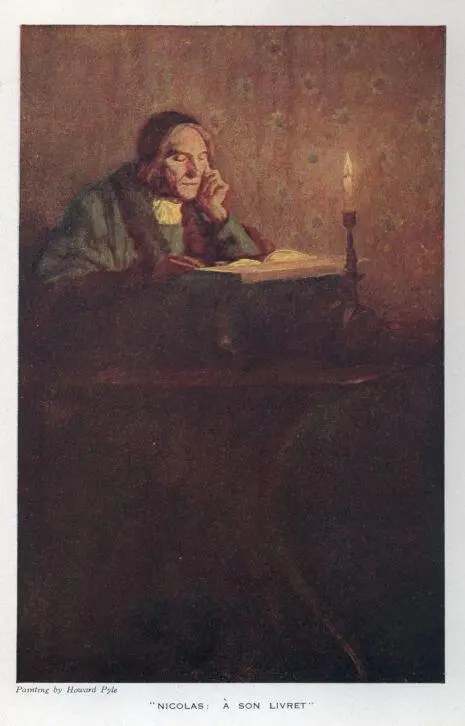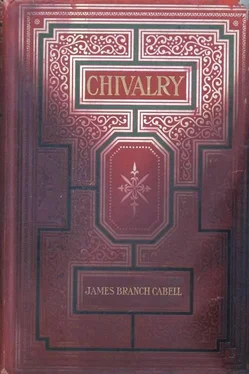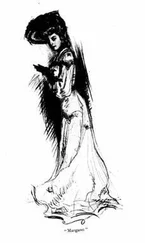James Cabell - Chivalry
Здесь есть возможность читать онлайн «James Cabell - Chivalry» весь текст электронной книги совершенно бесплатно (целиком полную версию без сокращений). В некоторых случаях можно слушать аудио, скачать через торрент в формате fb2 и присутствует краткое содержание. Жанр: Фэнтези, на английском языке. Описание произведения, (предисловие) а так же отзывы посетителей доступны на портале библиотеки ЛибКат.
- Название:Chivalry
- Автор:
- Жанр:
- Год:неизвестен
- ISBN:нет данных
- Рейтинг книги:3 / 5. Голосов: 1
-
Избранное:Добавить в избранное
- Отзывы:
-
Ваша оценка:
- 60
- 1
- 2
- 3
- 4
- 5
Chivalry: краткое содержание, описание и аннотация
Предлагаем к чтению аннотацию, описание, краткое содержание или предисловие (зависит от того, что написал сам автор книги «Chivalry»). Если вы не нашли необходимую информацию о книге — напишите в комментариях, мы постараемся отыскать её.
Chivalry — читать онлайн бесплатно полную книгу (весь текст) целиком
Ниже представлен текст книги, разбитый по страницам. Система сохранения места последней прочитанной страницы, позволяет с удобством читать онлайн бесплатно книгу «Chivalry», без необходимости каждый раз заново искать на чём Вы остановились. Поставьте закладку, и сможете в любой момент перейти на страницу, на которой закончили чтение.
Интервал:
Закладка:
Very shyly Dame Meregrett lifted her little mouth toward his hot and bearded lips. "Patience," she said, "is a virtue; and daring is a virtue; and hope, too, is a virtue: and otherwise, beau sire, I would not live."
And in consequence, after a deal of political tergiversation (Nicolas concludes), in the year of grace 1299, on the day of our Lady's nativity, and in the twenty-seventh year of King Edward's reign, came to the British realm, and landed at Dover, not Dame Blanch, as would have been in consonance with seasoned expectation, but Dame Meregrett, the other daughter of King Philippe the Bold; and upon the following day proceeded to Canterbury, whither on the next Thursday after came Edward, King of England, into the Church of the Trinity at Canterbury, and therein espoused the aforesaid Dame Meregrett.
IV
The Story of the Choices
"Sest fable es en aquest mon
Semblans al homes que i son;
Que el mager sen qu'om pot aver
So es amar Dieu et sa mer,
E gardar sos comendamens."
THE FOURTH NOVEL.—YSABEAU OF FRANCE, DESIROUS OF
DISTRACTION, LOOKS FOR RECREATION IN THE TORMENT
OF A CERTAIN KNIGHT, WHOM SHE PROVES TO BE NO MORE
THAN HUMAN; BUT IN THE OUTCOME OF HER HOLIDAY
HE CONFOUNDS THIS QUEEN BY THE WIT OF HIS REPLY.
In the year of grace 1327 (thus Nicolas begins) you could have found in all England no lovers more ardent in affection or in despair more affluent than Rosamund Eastney and Sir Gregory Darrell. She was Lord Berners' only daughter, a brown beauty, and of extensive repute, thanks to such among her retinue of lovers as were practitioners of the Gay Science and had scattered broadcast innumerable Canzons in her honor; and Lord Berners was a man who accepted the world as he found it.
"Dompnedex!" the Earl was wont to say; "in sincerity I am fond of Gregory Darrell, and if he chooses to make love to my daughter that is none of my affair. The eyes and the brain preserve a proverbial warfare, which is the source of all amenity, for without lady-service there would be no songs and tourneys, no measure and no good breeding; and, in a phrase, a man delinquent in it is no more to be valued than an ear of corn without the grain. Nay, I am so profoundly an admirer of Love that I can never willingly behold him slain, of a surfeit, by Matrimony; and besides, the rapscallion could not to advantage exchange purses with Lazarus; and, moreover, Rosamund is to marry the Earl of Sarum a little after All Saints' day."
"Sarum!" people echoed. "Why, the old goat has had two wives already!"
And the Earl would spread his hands. "One of the wealthiest persons in England," he was used to submit.
Thus it fell out that Sir Gregory came and went at his own discretion as concerned Lord Berners' fief of Ordish, all through those gusty times of warfare between Sire Edward and Queen Ysabeau, until at last the Queen had conquered. Lord Berners, for one, vexed himself not inordinately over the outcome of events, since he protested the King's armament to consist of fools and the Queen's of rascals; and had with entire serenity declined to back either Dick or the devil.
It was in the September of this year, a little before Michaelmas, that they brought Sir Gregory Darrell to be judged by the Queen, for notoriously the knight had been Sire Edward's adherent. "Death!" croaked Adam Orleton, who sat to the right hand, and, "Young de Spencer's death!" amended the Earl of March, with wild laughter; but Ysabeau leaned back in her great chair—a handsome woman, stoutening now from gluttony and from too much wine—and regarded her prisoner with lazy amiability, and devoted the silence to consideration of how scantily the man had changed.
"And what was your errand in Figgis Wood?" she demanded in the ultimate—"or are you mad, then, Gregory Darrell, that you dare ride past my gates alone?"
He curtly said, "I rode for Ordish."
Followed silence. "Roger," the Queen ordered, sharply, "give me the paper which I would not sign."
The Earl of March had drawn an audible breath. The Bishop of London somewhat wrinkled his shaggy brows, as a person in shrewd and epicurean amusement, what while she subscribed the parchment within the moment, with a great scrawling flourish.
"Take, in the devil's name, the hire of your dexterities," said Ysabeau, and pushed this document with her wet pen-point toward March, "and ride for Berkeley now upon that necessary business we know of. And do the rest of you withdraw, saving only my prisoner—my prisoner!" she said, and laughed not very pleasantly.

Followed another silence. Queen Ysabeau lolled in her carven chair, considering the comely gentleman who stood before her, fettered, at the point of shameful death. There was a little dog in the room which had come to the Queen, and now licked the palm of her left hand, and the soft lapping of its tongue was the only sound you heard. "So at peril of your life you rode for Ordish, then, messire?"
The tense man had flushed. "You have harried us of the King's party out of England—and in reason I might not leave England without seeing her."
"My friend," said Ysabeau, as half in sorrow, "I would have pardoned anything save that." She rose. Her face was dark and hot. "By God and all His saints! you shall indeed leave England to-morrow and the world as well! but not without a final glimpse of this same Rosamund. Yet listen: I, too, must ride with you to Ordish—as your sister, say—Gregory, did I not hang last April the husband of your sister? Yes, Ralph de Belomys, a thin man with eager eyes, the Earl of Farrington he was. As his widow will I ride with you to Ordish, upon condition you disclose to none at Ordish, saving only, if you will, this quite immaculate Rosamund, even a hint of our merry carnival. And to-morrow (you will swear according to the nicest obligations of honor) you must ride back with me to encounter—that which I may devise. For I dare to trust your naked word in this, and, moreover, I shall take with me a sufficiency of retainers to leave you no choice."
Darrell knelt before her. "I can do no homage to Queen Ysabeau; yet the prodigal hands of her who knows that I must die to-morrow and cunningly contrives, for old time's sake, to hearten me with a sight of Rosamund, I cannot but kiss." This much he did. "And I swear in all things to obey her will."
"O comely fool!" the Queen said, not ungently, "I contrive, it may be, but to demonstrate that many tyrants of antiquity were only bunglers. And, besides, I must have other thoughts than that which now occupies my heart: I must this night take holiday, lest I go mad."
Thus did the Queen arrange her holiday.
"Either I mean to torture you to-morrow," Dame Ysabeau said, presently, to Darrell, as these two rode side by side, "or else I mean to free you. In sober verity I do not know. I am in a holiday humor, and it is as the whim may take me. But you indeed do love this Rosamund Eastney? And of course she worships you?"
"It is my belief, madame, that when I see her I tremble visibly, and my weakness is such that a child has more intelligence than I—and toward such misery any lady must in common reason be a little compassionate."
Her hands had twitched so that the astonished palfrey reared. "I design torture," the Queen said; "ah, I perfect exquisite torture, for you have proven recreant, you have forgotten the maid Ysabeau—Le Desir du Cuer, was it not, my Gregory?"
Читать дальшеИнтервал:
Закладка:
Похожие книги на «Chivalry»
Представляем Вашему вниманию похожие книги на «Chivalry» списком для выбора. Мы отобрали схожую по названию и смыслу литературу в надежде предоставить читателям больше вариантов отыскать новые, интересные, ещё непрочитанные произведения.
Обсуждение, отзывы о книге «Chivalry» и просто собственные мнения читателей. Оставьте ваши комментарии, напишите, что Вы думаете о произведении, его смысле или главных героях. Укажите что конкретно понравилось, а что нет, и почему Вы так считаете.



